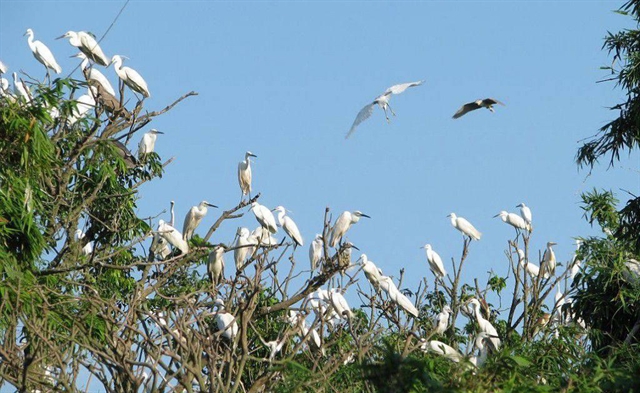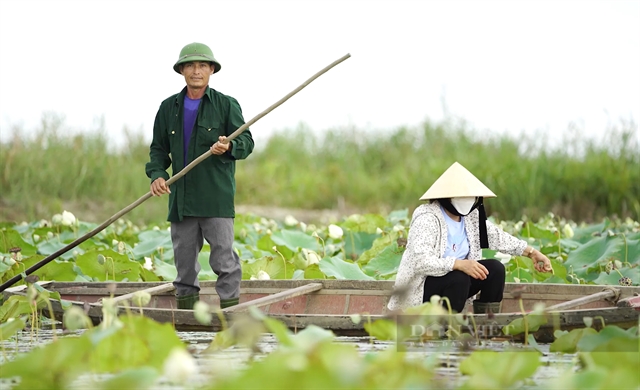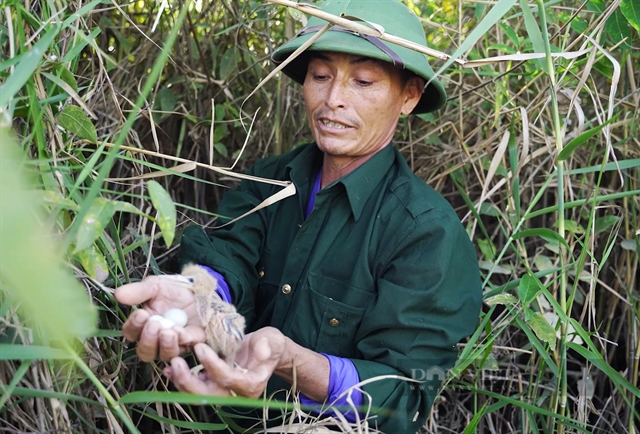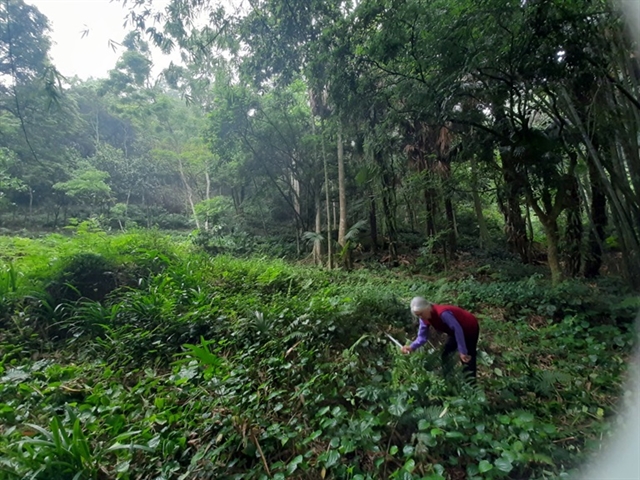 Environment
Environment

 |
| Wild birds are seen at the Hải Lựu 'stork garden' in Vĩnh Phúc Province. Farmers of different localities volunteer to take care of the wild birds to protect the environment. Photo vinhphuc.gov.vn |
Đăng Khôi & Thu Thủy
Recognising the importance of wild birds to the environment, farmers in different provinces throughout Việt Nam have for years spent time and effort to save them, giving them a home to nest and lay eggs.
Nguyễn Công Xuân and his wife Đỗ Thị Hoa in Xuân Hòa Village, Lệ Thủy District of Quảng Bình Province, have joined hands in such protection activities for almost five years, and they intend to carry on their mission forever.
"In the early 2000s, we rented a 10ha area at Hạc Hải Lagoon for agricultural and aquacultural business. At the time, many storks and other birds were flying around our place all day, so we trapped them and sold them," said Xuân.
"Selling wild birds brought us a lot of money at that time. I could earn almost VNĐ7 million (US$300) daily on a peak day. Despite many birds being hunted, there were never enough to satisfy demand."
 |
| Nguyễn Công Xuân (left) and his wife Đỗ Thị Hoa visit Hạc Hải Lagoon every day to make sure wild birds are safe. Photo đaioanket.vn |
After a while, Xuân found that the number of birds had rapidly decreased and felt sorry for the lagoon and the wider environment.
"I couldn't sleep at night. I imagined the sound of many storks in cauldrons blaming me and my acts," Xuân said. “I told my wife we needed to stop the bird hunting and trading business.”
His wife Hoa immediately agreed, and the couple switched to protecting the wild birds, ensuring their safety, at least on their land and the lagoon.
"It is like our atonement for our guilt that we kill the birds, although we were not welcomed by other poachers and traders," said 50-year-old Xuân, who now spends half of his time on the lagoon.
Xuân borrowed VNĐ100 million ($4,200) to spend on growing coconut trees on his land and improving the birds’ habitat.
Feeling safe, more birds returned and laid eggs at Hạc Hải Lagoon.
Aside from providing a home, Xuân and Hoa also cared for injured birds and baby ones if needed.
 |
| Farmer Nguyễn Công Xuân in Xuân Hòa Village, Lệ Thủy District of Quảng Bình Province, takes care of a baby bird and eggs when needed. He says saving the birds is his life-long duty. Photo đaiđoanket.vn |
However, many coconut palm trees fell in a recent storm and floods that caused several birds to lose their nests, and they had to move away.
"The flood sank our efforts and money and drove the birds away. I was sorry about it," said Xuân, who plans to restore the rich habitat for the birds.
"The first job is to restore the lagoon. Then we will buy more fig trees and freshwater mangroves for our bird shelters. Leafy trees will bring the birds back," said Xuân, who thinks it will cost nearly VNĐ200 million.
Hoa said: "Many birds have settled at our lagoon in recent two years. They fly away for food and return in the evening. We love seeing them and feel we have partly paid back for our past wrongdoings."
"We promise to take care of the birds till we die and hope our deeds will inspire and encourage people to join us. Saving the birds means we save the environment, the biological balance and our life."
Stork mother
More than 60km to the north of Hà Nội, 80-year-old Vũ Thị Khiêm has spent most of her life saving wild birds.
Khiêm is a resident of Đồng Dừa Village in Vĩnh Phúc Province. She is known as the guardian of the Hải Lựu 'stork garden' as she has prevented the birds from being hunted and killed by poachers for many years.
"My parent passed away and made me heir to this forest where they reclaimed the land and planted trees over many years. When I was 15, the first birds arrived here. The more the trees that were planted, the more the birds came," said Khiêm.
She and her family consider these flying creatures to be treasures of nature and are determined to save them at all costs.
Their tradition of growing more trees and saving the birds will remain with Khiêm, who inspires her grandchildren to follow her.
 |
| Vũ Thị Khiêm visits her garden to look after trees which are her birds' shelters in the Hải Lựu stork garden in VĨnh Phúc Province. Photo vinhphuc.gov.vn |
In the 15ha wood, there are many kinds of birds, but most are storks.
Whether sunny or rainy, Khiêm walks to the wood every day, watching and taking care of the birds as carefully as her children, especially during the breeding season.
"Many hunters came here to steal and shoot my storks. My neighbours and I caught some red-handed and freed the birds, but sometimes they had already died," Khiêm said.
"I also found some kids in the village trying to hunt the birds, but instead of shouting at them, I talked with them and asked them not to do it again. They then joined me in guarding the wood."
Khiêm and her family still live under challenging conditions, but she has never considered cutting down and selling the trees to ease her hardship.
“The storks are my kids. It is impossible to destroy their shelters. They will go away without a place to stay and might be hunted easily. Although I am poor, I never think of hurting them, and my grandchildren are also asked not to fell the trees or sell the wood,” she said.
In recent years, the Vĩnh Phúc Province People's Committee has supported Khiêm in preserving and promoting her wood.
A road leading to the small forest was built. Signboards were also set up to guide visitors here, forming an ecotourism destination and welcoming many visitors year-round thanks to its fresh, relaxed, green environment.
Nguyễn Ngọc Hiên, one of Khiêm's granddaughters, said that she had a plan to preserve and expand the wood. She would grow medicinal herbs under the large tree canopy. She would also combine livestock and poultry farming using sustainable practices to benefit her family while protecting the 'home' of the storks. VNS